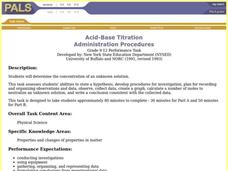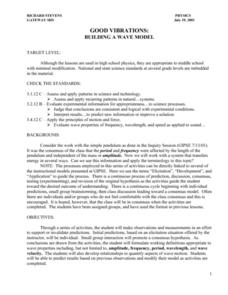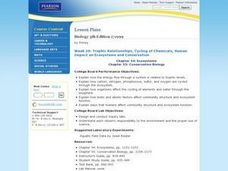Curated OER
Tadpoles
Young scholars examine tadpoles at various stages of development. They make careful scientific observations and compare the changes that occur at five different phases of a frog's life.
Curated OER
DNA in a "Snap"
Students observe a model of DNA and answer probing questions like, "What does this model represent?" They then work in small groups to construct an accurate model of DNA per rubric provided and present to the class explaining their model...
Curated OER
Ancient Hunters of the Great Lakes
Students describe theories on how the first humans came to America and show the evidence that supports it. In this investigative instructional activity students study given material and prepare written or oral reports in their groups.
Curated OER
Whole Lotta Shakin Going On
High schoolers study how tectonic plates can produce earthquakes. In this earthquake lesson students use a model earthquake machine to explore hypotheses about earthquakes.
Curated OER
Friction of a Block Weight
Fifth graders hypothesize and design an experiment to study the relationship between a block weight and the number of washers it takes to pull a block across various surfaces. Students graph results and apply their findings to a...
Curated OER
Velocity
Students determine the average speed of a toy car as it travels six different distances set up by Students. Three trials are done for each distance. The only requirements is that the longest distance must be at least three times longer...
Curated OER
Acid-Base Titration
Students determine the concentration of an unknown solution. This task assesses students' abilities to state hypothesis, develop procedures for investigation, plan for recording and organizing observations and data, collect data, create...
Curated OER
Electric Circuits
Students determine the power dissipated in the combination of two resistors connected in series to a 6 volt battery. This task assesses students' abilities to develop procedures for an investigation, develop a plan for recording and...
Curated OER
Hooke's Law
Students explore the relationship between the force applied to a spring and its stretch. They design and conduct an experiment to determine the stretch of spring with 15N of force without having an actual 15N mass.
Curated OER
Vitamin C Testing
High schoolers determine which of three beverage samples contains the most vitamin C. They then apply their knowledge to an additional situation. Students use beverages that have a large, definite difference of vitamin C content to...
Curated OER
Snell's Law
Students determine whether the index of refraction of sample of Corn Syrup meets Federal standards. This task assess students' abilities to explain the procedures for investigation, plan for recording and organizing observations and...
Curated OER
Hydrated Salt
Learners plan, design, and carry out an experiment to determine an empirical formula for a hydrated salt X that tell students when all the water has been removed from hydrate crystals.
Curated OER
Catalase Enzyme
Pupils design and conduct an experiment to test their ideas about how to speed up or slow down the rate of an enzyme-catalyzed reaction. They have access to an array of physical and chemical factors that might influence enzyme activity....
Curated OER
How Do The Colors of Light Mix?
Students investigate the mixing of light. They form a hypotheses to reason why color changes occur and they write conclusions and ask new questions arising from the investigation. Students identify the primary and complementary colors of...
Curated OER
Your Expedition of Discovery
Students study GPS and see how it is used to determine points on the Earths surface. In this expedition lesson plan students use GPS to find given coordinates.
Curated OER
Study of Projectile Motion using Straw Rockets
High schoolers design and launch their own rockets. In this experimental lesson students launch their own rockets and record the various angles and distance that they go. Each student has time to redesign their rocket and have a...
Curated OER
Good Vibrations: Building a Wave Model
Students assess and apply recurring patterns in natural systems. They evaluate the wave properties of frequency, wavelength, and speed as applied to sound. Students develop a relationship to quantify aspects of wave motion. They predict...
Curated OER
Trophic Relationships, Cycling of Chemicals, Human Impact on Ecosystems and Conservation
Learners explore how the energy flow through a system is related to trophic levels. They investigate how organisms affect the cycling of elements and water through the biosphere. Students participate in lab activities to observe ways...
Curated OER
Where in the World is Carbon Dixoide?
Students conduct experiments designed to detect the presence of CO2 by using a BTB that changes color (blue to yellow) in the presence of CO2. First, students experiment with the CO2 from combining vinegar and baking soda. In part two,...
Curated OER
Buoyant Force
Students investigate the scientific concept of why some objects float when put in a liquid solution. They apply the laws of motion and force while conducting classroom activities. Students also take notes and answer target questions to...
Curated OER
Discovering Physical Changes
Fourth graders determine what is meant by a physical change, and they demonstrate how they can make physical changes. They complete activities at stations that entail changes in color, size, texture, hardness, or state of matter. Using...
Curated OER
Habitat Cards
Students discuss the relationship between a habitat and the environment. In groups, they use the internet to research the relationship between the animals and the habitat on their card. They present their information to the class to...
Curated OER
Using the Very, Very Simple Climate Model in the Classroom
Students study the relationship between the average global temperature and carbon dioxide emissions. In this weather lesson students develop a test scenario using a model then read and interpret graphs of data.
Curated OER
The Puzzle of the Ice Age Americans
Students describe alternative theories for how the first humans cane to America. In this human origin instructional activity students study the origins of the first Americans.

























